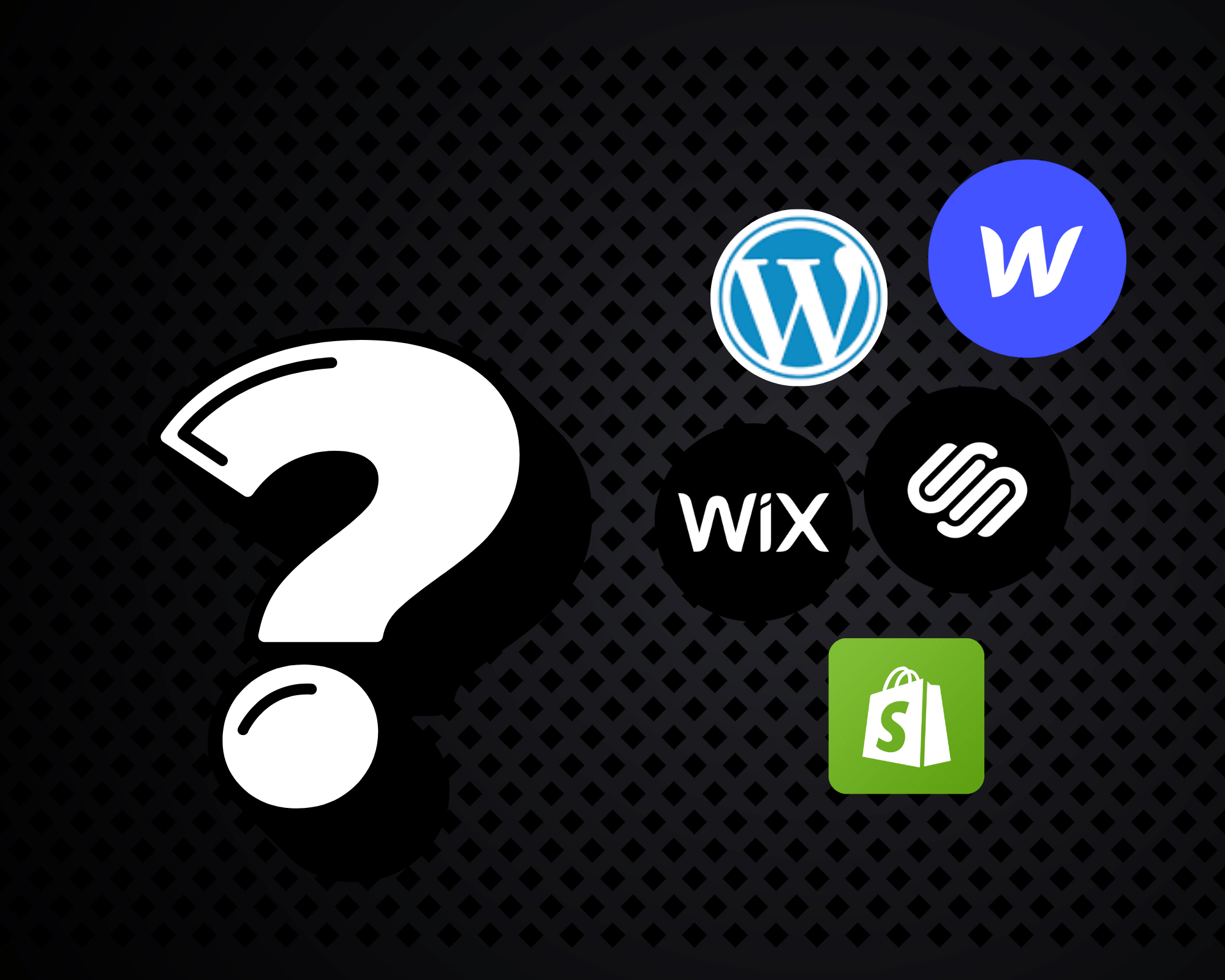In today’s digital landscape, having a robust Content Management System (CMS) is crucial for businesses aiming to establish a strong online presence. With numerous options available, selecting the right CMS can be a daunting task. This guide aims to demystify the process by comparing some of the most popular CMS platforms: WordPress, Webflow, Squarespace, Wix, and GoDaddy. By delving into their features, advantages, and limitations, we will help you make an informed decision tailored to your business needs.
What is a CMS?
CMS stands for “Content Management System.” It is a software application or platform designed to help individuals and organizations create, edit, organize, and manage digital content, typically for websites. A CMS allows users to publish and update content without requiring advanced technical skills or coding knowledge. It provides a user-friendly interface that facilitates tasks like creating new pages, uploading images and videos, formatting text, and organizing content into categories or sections. CMS tools are widely used to streamline the process of website development and maintenance, enabling multiple users to collaborate on content creation and ensuring consistent design and functionality across a website.
How to Choose the Best CMS for Your Business Website
When it comes to selecting the optimal CMS for your business website, several factors should be considered. Each CMS has its unique set of features and capabilities that cater to specific business requirements. Let’s explore the pros and cons of each platform to help you make an informed choice.
WordPress
WordPress is a versatile and widely-used content management system (CMS) that empowers users to create and manage websites and blogs with ease. Its user-friendly interface and extensive library of plugins and themes make customization straightforward, catering to a range of needs from personal blogs to complex e-commerce platforms. Its robust community support and regular updates have contributed to its popularity.
Pros:
- Versatility: WordPress is highly customizable, making it suitable for businesses of all sizes.
- Extensive Plugins: The availability of a vast range of plugins enables you to add various functionalities to your site.
- SEO-Friendly: WordPress offers excellent SEO capabilities, helping your site rank well on search engines.
- Cost-Effective: WordPress is free software that can be installed and used on cheaper hosting options than most other CMS platforms offer, making it a budget-friendly choice.
Cons:
- Learning Curve: While user-friendly, WordPress might require a learning curve, especially for beginners.
- Maintenance: Regular updates and security measures are essential to keep your WordPress site secure.
Webflow
Webflow stands out as a dynamic visual web design platform that enables designers and developers to craft responsive websites without extensive coding. Combining a drag-and-drop interface with the flexibility of custom code, Webflow offers a unique balance between design and functionality. Its ability to generate clean HTML, CSS, and JavaScript code from the visual design aids developers in creating polished, efficient websites that meet modern design standards.
Pros:
- Design Control: Webflow empowers designers with complete creative control, allowing for visually stunning websites.
- Responsive Design: The platform facilitates building responsive websites that adapt seamlessly to different devices.
- Hosting Included: Webflow provides hosting services, simplifying the website management process.
Cons:
- Complexity: Webflow’s advanced features can be overwhelming for those unfamiliar with web design.
- Limited E-commerce: While improving, Webflow’s e-commerce capabilities are still evolving.
Squarespace
Squarespace is a user-friendly CMS designed for individuals and small businesses seeking to establish an online presence quickly. Featuring elegant templates and a straightforward editing system, Squarespace enables users to create visually appealing websites without demanding technical expertise. It’s particularly well-suited for portfolios, blogs, and small online stores, offering integrated tools for managing content and basic e-commerce functionalities.
Pros:
- Ease of Use: Squarespace’s user-friendly interface is ideal for those without technical skills.
- Stunning Templates: The platform offers aesthetically pleasing templates that cater to various industries.
- All-in-One Solution: Squarespace provides domain and hosting, making it a convenient choice.
Cons:
- Limited Customization: While templates are stylish, customization options can be limited for more complex designs.
- E-commerce Limitations: Squarespace’s e-commerce functionalities might not suit large online stores.
Wix
Wix is a versatile and accessible website builder that caters to a wide spectrum of users, from beginners to professionals. Its drag-and-drop editor and vast selection of templates make it effortless to design and launch websites of various types, from personal portfolios to online stores. Wix App Market adds extra functionalities through third-party apps, giving users the freedom to expand their website’s capabilities as needed.
Pros:
- Drag-and-Drop Builder: Wix’s intuitive drag-and-drop builder simplifies website creation.
- App Market: The Wix App Market offers numerous add-ons and integrations.
- E-commerce Ready: Wix provides solid e-commerce tools for online stores.
Cons:
- Scalability: While great for small businesses, Wix might not be as scalable for larger enterprises.
- Ads on Free Plan: The free plan includes Wix ads, which might not be ideal for professional websites.
Shopify
Shopify is a leading e-commerce platform tailored for businesses looking to establish and manage their online stores. With a focus on simplifying the selling process, Shopify provides tools for inventory management, secure payment gateways, customizable storefronts, and order fulfillment. Its intuitive interface enables entrepreneurs to launch and operate professional online shops without in-depth technical knowledge, making it a go-to choice for online retail.
Pros:
- E-commerce Focus: Shopify is designed specifically for e-commerce, offering a range of features for online stores.
- User-Friendly: The platform simplifies the process of setting up and managing an online store.
- App Store: Shopify’s App Store provides a variety of extensions and integrations for added functionality.
Cons:
- Cost: Shopify’s pricing might be higher compared to other CMS platforms, especially for smaller businesses.
- Limited Customization: While Shopify offers customization, it might not match the level of some other platforms.
Which CMS is the Best Choice for You?
In conclusion, the best CMS for your business website depends on your specific needs and goals. If you value versatility and customizability, WordPress might be your top pick. Webflow is a great choice for design-focused businesses, while Squarespace offers user-friendly simplicity. Wix is ideal for small businesses with e-commerce aspirations, and and Shopify is tailored for businesses focused on online selling. Take into account your technical expertise, design preferences, scalability requirements, and budget when making your decision.
FAQs
Q: How do I decide between WordPress and Webflow?
A: Consider your technical proficiency and design requirements. WordPress offers more customization, while Webflow is ideal for visually stunning websites.
Q: Is Squarespace’s e-commerce suitable for large businesses?
A: While Squarespace’s e-commerce tools are improving, they might not be as robust as those offered by dedicated e-commerce platforms.
Q: Can I switch between CMS platforms later?
A: Yes, you can migrate your website to a different CMS, but the process can be complex and time-consuming.
Q: Are there additional costs beyond the CMS subscription?
A: Yes, consider costs for domain registration, hosting, premium themes, plugins, and integrations.
Q: Which CMS is best for blogging?
A: WordPress excels in blogging due to its extensive blogging features and SEO capabilities.
Q: Does Shopify offer advanced features for large-scale websites?
A: Shopify focuses on e-commerce features, making it a great choice for online stores, but it might have limitations for broader website needs.



